7 Best Herbal Tinctures For Nerve Pain
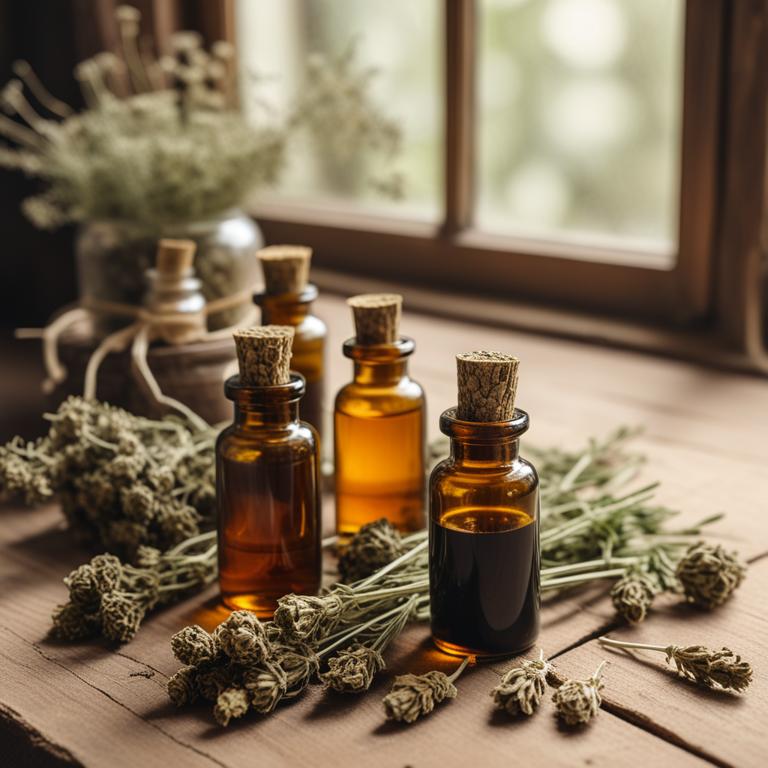
Herbal tinctures for nerve pain are liquid extracts made from plants, herbs, and flowers that are used to alleviate discomfort and numbness associated with nerve damage or inflammation.
These tinctures have been shown to provide benefits in treating nerve pain due to their anti-inflammatory, antioxidant, and analgesic properties, making them a popular natural remedy for individuals seeking a more holistic approach to pain management.
Examples of herbal tinctures commonly used to treat nerve pain include Willow Bark Tincture, which contains salicin, a natural pain reliever similar to aspirin; Capsicum Tincture, which contains capsaicin, a compound that blocks the production of a chemical involved in the transmission of pain; St. John's Wort Tincture, which has anti-inflammatory and antioxidant properties that can help reduce inflammation and promote healing; and Valerian Root Tincture, which has a sedative effect that can help reduce nerve pain and promote relaxation; Passionflower Tincture, which has a calming effect that can help reduce stress and anxiety that can exacerbate nerve pain; and Devil's Claw Tincture, which contains harpagoside, a compound that has anti-inflammatory and pain-relieving properties.
By incorporating herbal tinctures into their treatment plan, individuals may experience a reduction in nerve pain and an improvement in overall well-being.
According to "Current pharmaceutical biotechnology", tinctures for nerve pain may be effective in alleviating neuropathic pain due to the potential benefits of herbal drugs as an alternative or complementary treatment.
Below there's a list of the 7 best herbal tinctures for nerve pain.
- 1. Hypericum perforatum tinctures
- 2. Valeriana officinalis tinctures
- 3. Acmella oleracea tinctures
- 4. Curcuma longa tinctures
- 5. Ligusticum wallichii tinctures
- 6. Actaea racemosa tinctures
- 7. Lavandula angustifolia tinctures
Also you may be interested in...
TODAY'S FREE BOUNDLE
Herb Drying Checklist + Herbal Tea Shopping List + Medicinal Herbs Flashcards
Enter you best email address below to receive this bundle (3 product valued $19.95) for FREE + exclusive access to The Aphotecary Letter.
$19.95 -> $0.00
1. Hypericum perforatum tinctures

Hypericum perforatum tinctures, derived from the St. John's Wort plant, have been traditionally used to treat nerve pain ailments such as neuropathy and sciatica.
The properties of this herbal preparation help to reduce inflammation and alleviate pain by interacting with neurotransmitters and ion channels in the nervous system.
The bioactive constituents of Hypericum perforatum, including hyperforin, hypericin, and flavonoids, have been shown to possess analgesic and anti-inflammatory properties, which contribute to its therapeutic effects.
Regular use of Hypericum perforatum tinctures has been reported to provide benefits in managing nerve pain, including improved sleep quality, reduced anxiety, and enhanced overall well-being.
Related Study
According to "Zeitschrift fur Naturforschung. C, Journal of biosciences", Hypericum perforatum tinctures for nerve pain may be a novel therapeutic strategy due to their anti-inflammatory and analgesic effects, particularly in countering chemotherapy-induced neuropathy.
2. Valeriana officinalis tinctures

Valeriana officinalis tinctures are a popular herbal preparation used to treat nerve pain ailments, particularly conditions such as sciatica, neuropathy, and fibromyalgia.
This herbal preparation's sedative and anti-inflammatory properties help to reduce nerve pain by promoting relaxation, calming the nervous system, and reducing inflammation.
The bioactive constituents present in Valeriana officinalis, including valerenic acid, isovaleric acid, and valepotriates, contribute to its pain-relieving properties by modulating the GABA receptor, reducing excitatory neurotransmitter release, and inhibiting the production of pro-inflammatory enzymes.
Regular use of Valeriana officinalis tinctures can provide long-term relief from nerve pain, improve sleep quality, and enhance overall well-being, making it a valuable natural remedy for those suffering from nerve-related disorders.
Related Study
According to "World journal of plastic surgery", Valeriana officinalis tinctures for nerve pain have shown a significant decrease in pain score in the acute phase compared to the control group when administered to rats.
3. Acmella oleracea tinctures
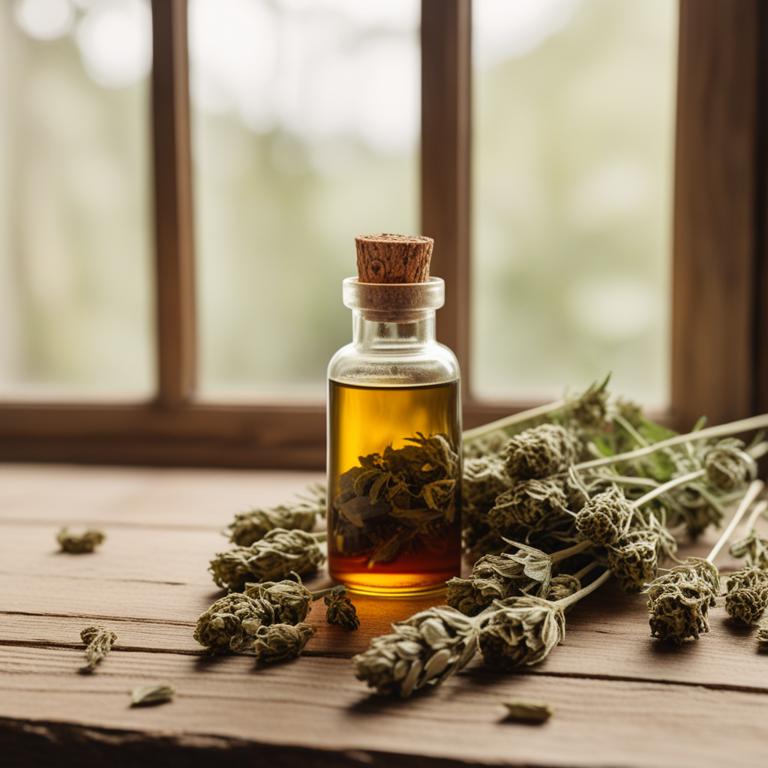
Acmella oleracea tinctures have been found to be effective in treating nerve pain ailments due to their anti-inflammatory, analgesic, and antioxidant properties.
The tannins, flavonoids, and alkaloids present in this herbal preparation help to reduce inflammation and alleviate pain by inhibiting the production of pro-inflammatory enzymes and blocking the action of pain receptors.
The bioactive constituents of Acmella oleracea tinctures, such as 11-oxo-α-ionone and 11-oxo-β-ionone, have been shown to exhibit potent analgesic and anti-inflammatory activities, providing relief from nerve pain.
The benefits of using Acmella oleracea tinctures to treat nerve pain include reduced inflammation, relief from pain, and improved overall well-being, making it a valuable natural remedy for managing this debilitating condition.
4. Curcuma longa tinctures

Curcuma longa tinctures, derived from the rhizomes of the turmeric plant, possess potent anti-inflammatory and antioxidant properties that help to alleviate nerve pain associated with conditions like neuralgia and neuropathy.
The bioactive constituents, including curcuminoids, demethoxycurcumin, and bisdemethoxycurcumin, exhibit potent anti-inflammatory and analgesic effects, which contribute to the tincture's therapeutic benefits.
By modulating the activity of pro-inflammatory enzymes and cytokines, Curcuma longa tinctures help to reduce inflammation and alleviate nerve pain, promoting improved quality of life for individuals suffering from this debilitating ailment.
The benefits of using Curcuma longa tinctures to treat nerve pain include reduced reliance on conventional medications, minimized side effects, and enhanced overall well-being.
Related Study
According to "Iranian journal of basic medical sciences", Curcuma longa tinctures for nerve pain exhibited beneficial effects in neuropathic pain models, possibly through mechanisms such as anti-oxidant activity, anti-inflammatory, anti-apoptotic, neuroprotective and calcium inhibitory actions.
5. Ligusticum wallichii tinctures
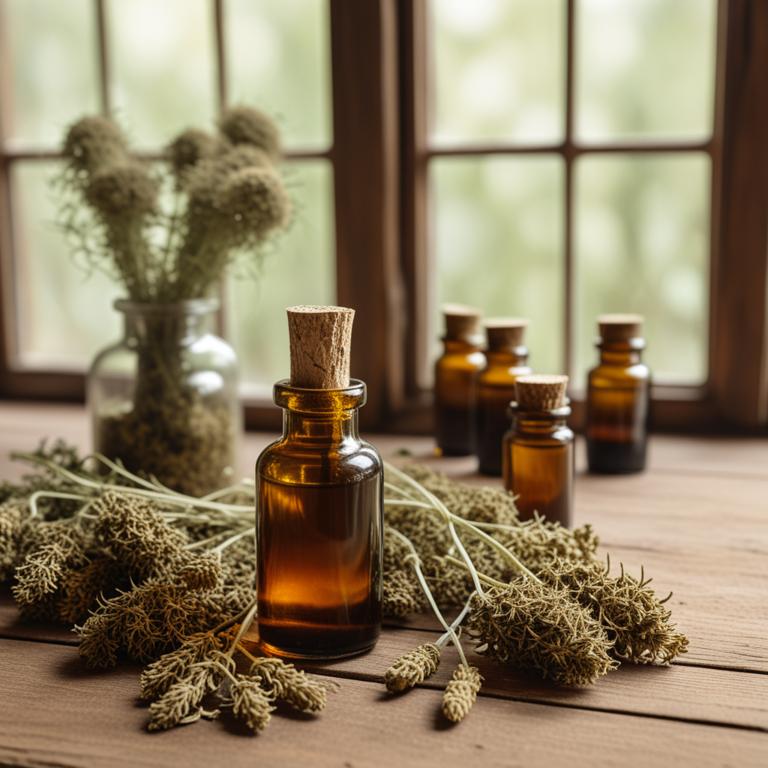
Ligusticum wallichii tinctures, also known as Chuan Xiong, are a traditional herbal preparation used to treat nerve pain ailments such as trigeminal neuralgia and sciatica.
The properties of this herbal preparation that help to treat this ailment include its anti-inflammatory and analgesic properties, which help to reduce pain and inflammation in the affected areas.
The bioactive constituents of Ligusticum wallichii, including ferulic acid and essential oils, contribute to its therapeutic effects by inhibiting the production of pain-causing chemicals and promoting blood flow to the affected areas.
The benefits of using Ligusticum wallichii tinctures to treat nerve pain include reduced pain and inflammation, improved sleep quality, and enhanced overall well-being.
6. Actaea racemosa tinctures
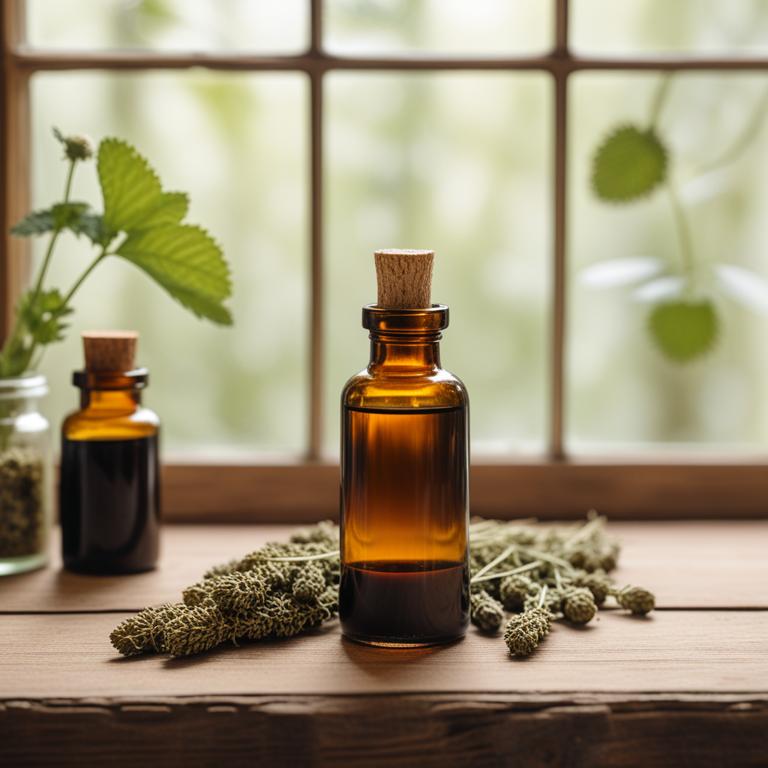
Actaea racemosa tinctures have been traditionally used to treat nerve pain, particularly in the case of shingles and postherpetic neuralgia.
The analgesic and anti-inflammatory properties of this herbal preparation help to reduce pain and discomfort associated with nerve damage.
The bioactive constituents, including actein, cimicifugine, and bergapten, have been found to possess antiviral and anti-inflammatory effects, which contribute to the relief of nerve pain.
By reducing inflammation and modulating the nervous system, Actaea racemosa tinctures offer a natural and potentially effective treatment option for individuals suffering from nerve pain.
7. Lavandula angustifolia tinctures
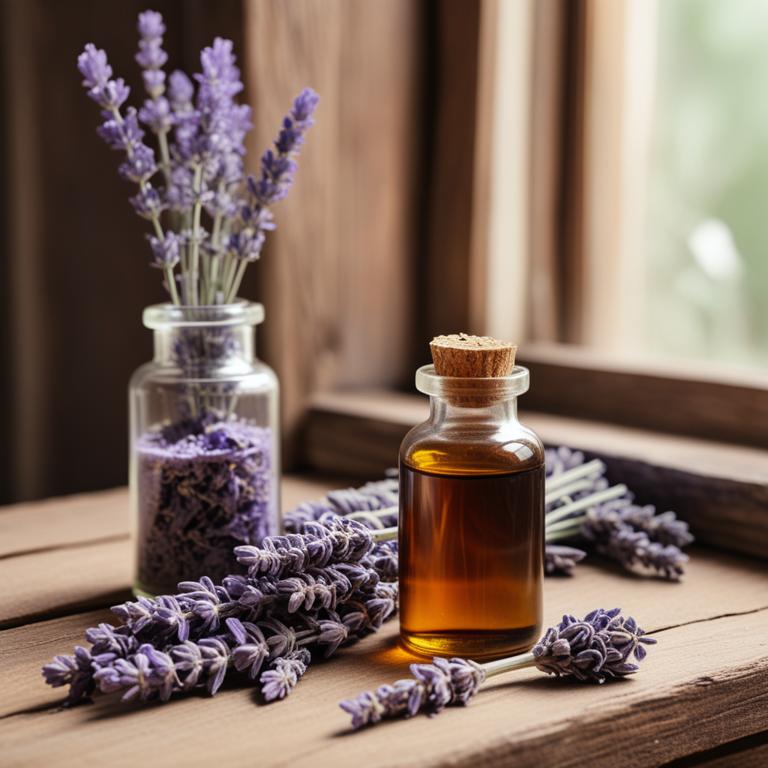
Lavandula angustifolia tinctures have been traditionally used to treat nerve pain ailments, such as neuropathy and fibromyalgia, due to their anti-inflammatory and analgesic properties.
The bioactive constituents of Lavandula angustifolia, including linalool and linalyl acetate, help to reduce pain and inflammation by interacting with the nervous system and modulating the release of pain-causing neurotransmitters.
The benefits of using Lavandula angustifolia tinctures to treat nerve pain include reduced symptoms, improved sleep quality, and enhanced overall well-being.
By reducing inflammation and pain, Lavandula angustifolia tinctures can help individuals suffering from nerve pain to manage their symptoms and improve their quality of life.